#Songs from The Train (1970)
Text
youtube
Message From a Black Man - Derrick Harriott & The Crystalites (Psychedelic Train 1970)
#Soul#Soul Music#Soul Music Songs#Music#Music Songs#Derrick Harriott#Message From a Black Man#Reggae Soul#Song Bird#1970#The Crystalites#Psychedelic Train#Youtube
16 notes
·
View notes
Text
Run-DMC featuring Aerosmith - Walk This Way
1986
"Walk This Way" is a song by the American rockband Aerosmith. Written by Steven Tyler and Joe Perry, the song was originally released as the second single from the album Toys in the Attic (1975). It peaked at number 10 on the Billboard Hot 100 in early 1977, part of a string of successful hit singles for the band in the 1970s.
In 1986, the hip hop group Run-DMC covered "Walk This Way" in collaboration with Aerosmith, and it became a touchstone for the new musical subgenre of rap rock, or the melding of rock and hip hop.
This version of the song charted higher on the Billboard Hot 100 than the original, peaking at number 4, becoming Run-DMC's biggest hit. It was also the first hip hop single to reach the top five on the Billboard charts, as well as one of the first big hip hop singles in the UK, peaking at number 8. It won both groups a Soul Train Music Award for Best Rap Single in 1987. Raising Hell was nominated for a Grammy Award, making Run-DMC the first hip hop act to receive a nomination. In 2017, it was inducted into the National Recording Registry by the Library of Congress as being "culturally, historically, or artistically significant".
Both versions of "Walk This Way" are in the Grammy Hall of Fame.
The 1986 video for "Walk This Way" symbolically places Aerosmith and Run-DMC in a musical duel in neighbouring studios before Steven Tyler literally breaks through the wall that separates them. The video segues to the bands' joint performance on stage. The highly popular result was the first hip hop hybrid video played in heavy rotation on MTV, and is regarded as a classic.
"Walk This Way" received a total of 68,3% yes votes!
Previous Aerosmith polls: #84 "Falling in Love (Is Hard on the Knees)".
youtube
753 notes
·
View notes
Text

Today In History
Yvette Marie Stevens, better known as Chaka Khan was born March 23, 1953 in Chicago, Illinois. Chaka Khan is a true Renaissance Woman. A singer, songwriter, producer, visual artist, author, actor, philanthropist, entrepreneur, activist and mother, Chaka is an international music icon who has influenced multiple generations of artists and continues to do so. From the moment she burst onto the music scene in the 1970s as the 18-year-old lead singer of the multiracial band Rufus, her powerful voice and show-stopping stage presence set her apart from any other singer, and during her 40-year career, she has developed a vast international fan base and performed on six continents.
Chaka is a ten-time GRAMMY® Award winner (with 22 GRAMMY® nominations) who has the rare ability to sing in eight music genres, including R&B, jazz, pop, rock, gospel, country, classical and dance music. She has released 22 albums and racked up ten #1 Billboard magazine charted songs, eight RIAA certified gold singles and eleven RIAA certified gold and platinum albums. Chaka’s recorded music has produced over 2,000 catalogue song placements.
She was awarded a BET Honors and was the recipient of the Trumpet Award (Legend Award); honored by the Howard Theatre Restoration, Inc., at its 2nd Annual Gala and Benefit Concert; inducted into the Apollo Legends Hall of Fame at its Annual Spring Gala; inducted into the Hollywood Bowl Hall of Fame; honored with a star on the Hollywood Walk of Fame and with the United Negro College Fund’s An Evening of Stars Tribute. She also received the Soul Train Legend Award (2009), the BET Lifetime Achievement Award (2006), the GRAMMY® Honors Award from the NARAS Chicago Chapter (2006) and the World Music Lifetime Achievement Award (2003). In 2004, she was awarded an Honorary Doctorate of Music from the Berklee School of Music in Boston, MA.
A living ICON.
CARTER Magazine
#chaka khan#carter magazine#carter#historyandhiphop365#wherehistoryandhiphopmeet#history#cartermagazine#today in history#staywoke#blackhistory#blackhistorymonth
74 notes
·
View notes
Text

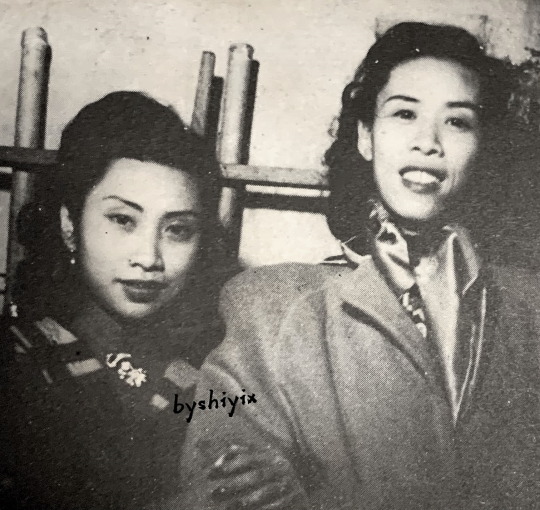
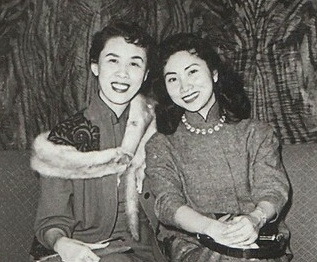
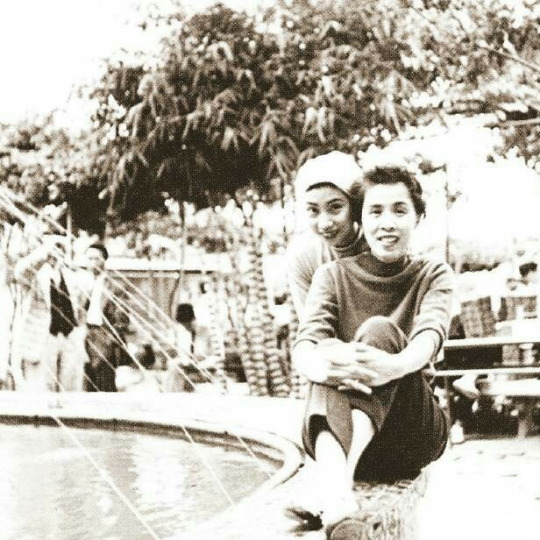

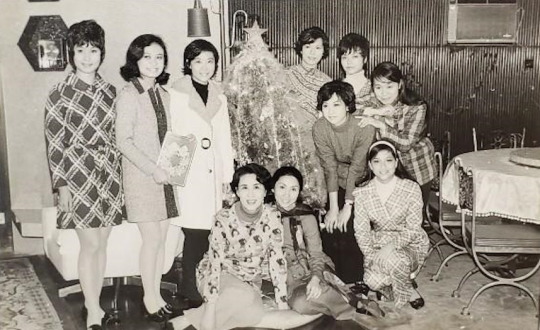


Female Queer Icons of Hong Kong // Yam Kim Fai (任劍輝) and Pak Suet Sin (白雪仙)
Photo 1: Promotional photo for 1955 contemporary movie The Model and the Car (玉女香車) (no video available) (Source: LCSD Museum Collection Search Portal)
Photo 4: Photo from Sin Fung Ming Opera Troupe's 1958 trip
Photo 5: Photo from a 1962 newspaper feature on Yam, Pak, and others at their (?) summer villa in Central, Hong Kong
Photo 6: Christmas celebrations with Yam, Pak, and their protégés of the Chor Fung Ming Troupe
Far and away the most iconic duo in Cantonese opera, Yam Kim Fai (任劍輝) and Pak Suet Sin (白雪仙) – commonly referred to simply as Yam-Pak (任白) – were famed for their partnership both on and off the stage… Click below to learn more!
Edit on 28/07/2023: Updated to link to a photo of the entrance to the Hong Kong Heritage Museum’s Pop Culture 60+ exhibit, and to add information regarding Yam and Pak's marriage status.
Iconic? How?
Yam-Pak are the face of Cantonese opera; you can't talk about the latter without mentioning the former. It's to the point where a gigantic picture of them graces the entrance to the Hong Kong Heritage Museum’s permanent exhibition on Hong Kong pop culture’s evolution across the past 60 years (“Hong Kong Pop 60+”) - they are the first thing you see upon entering!
Best known as the originators - with Yam playing the male leads and Pak the female leads - of five masterpieces of Cantonese opera, namely:
1. Princess Cheung Ping (帝女花)
2. The Legend of the Purple Hairpin (紫釵記)
3. The Dream Tryst in the Peony Pavilion (牡丹亭驚夢)
4. The Reincarnation of Lady Plum Blossom (再世紅梅記)
5. Butterfly and Red Pear Blossom (蝶影紅梨記)
(Note: Princess Cheung Ping, Purple Hairpin, and Butterfly and Red Pear Blossom were made into abridged movie versions, with the Sin Fung Ming troupe members reprising their roles from the theatre productions. Also, the "Fragrant Sacrifice" (香夭) duet from Princess Cheung Ping (movie clip) is one of - if not the most - famous songs in Cantonese opera.)
Yam and Pak were the leading pair and co-founders of the legendary Sin Fung Ming Opera Troupe (仙鳳鳴劇團; 1956-1961), which is widely held to have pushed Cantonese opera forward as an artform due to Pak and scriptwriter Tong Tik Sang’s (唐滌生) emphasis on poetic libretti and adapting source material from Chinese literature and history. (Note: it has been common practice since the 1930's for Cantonese opera troupes to be founded by key actor(s).)
They were also very active in the Hong Kong film industry in the 1950's, being paired in over 40 movies together across roughly 8 years. One of those – the aforementioned Butterfly and Red Pear Blossom (蝶影紅梨記) – is the sole Cantonese opera movie on the Hong Kong Film Archive’s 100-Must See Hong Kong Movies list (IMDB list / archived version of the official PDF). It's a well-deserved inclusion - check out this beautifully-shot dance scene.
Even their post-retirement activities had a significant effect on the industry! In the early 1960’s, they held auditions for prospective students and provided - for free - systematic, hands-on training to those who passed; Yam and Pak even hired other veterans to teach skills they personally were not as familiar with. Prior to this, apprentices were expected to learn primarily from observing their masters, and to pay handsomely for the privilege. Yam-Pak’s methods proved exceedingly effective: the Chor Fung Ming Opera Troupe (雛鳳鳴劇團; 1963-1992) starring their apprentices reigned supreme in the 1970’s-1980’s. Following this success, Cantonese opera institutes - most notably the major 1900s-era guild, the Chinese Artists Association of Hong Kong (八和會館) - started to offer systematic coaching to young hopefuls in the 1980's.
Okay, so why are they queer icons specifically?
The lazy answer is that they're queer icons because nearly all of Yam's roles were male, so Gender is involved by default, and since most hit Cantonese operas of the time were romances, that means you get to see two female actors performing being in love onscreen (and also on stage, but there aren't any video recordings from back then). So far, so Takarazuka Revue.
Female actors playing male roles in Cantonese opera
To give some context, each Cantonese opera performer specialises in one of four major role-types, and Yam was a sung (生) - i.e. an actor specialised in playing standard male roles. Female sung were fairly common in the 1910's-1930's due to women being banned from performing with men during that period, but when the ban lifted in the mid-1930's, many troupes shifted towards cis-casting. Yam was pretty much the only one whose popularity survived the transition. Just take a look at the huge number of Cantonese opera movies produced during the 1950’s-1960’s – you’ll be hard-pressed to find a female sung other than Yam, let alone one with top billing.
Happily, thanks to Yam's immense popularity, her profilic film career (over 300 movies!), and the prominence of Sin Fung Ming works in the Cantonese opera canon, there has been a resurgence in female sung which endures to this day. Two noteworthy examples are Yam's protégé Sabrina Lee/ Loong Kim Sang (龍劍笙) - a star in her own right - and Joyce Koi/ Koi Ming Fai (蓋鳴暉), one of the biggest names still active in the industry.
(Note: perhaps due to cinema being more "realistic" in nature, Yam's early movies often involved her playing female characters cross-dressing as men, including in some Cantonese opera movies. However, she received increasingly more male roles as her fame grew, and from the mid-1950's onwards she was playing male characters onscreen nearly exclusively-- even in non-Cantonese opera movies! See Photo 1 above.)
What sets Yam and Pak apart is that they were particularly known for their chemistry. Long before Sin Fung Ming's formation in 1956, the advertising copy for their first Cantonese opera movie together - Frolicking with a Pretty Maid in the Wineshop (酒樓戲鳳, 1952) - declared "Only this movie has Yam-Pak flirting on the silver screen" (source - 華僑日報 1952/05/23-26). And indeed, they were popular for their flirtatious duets: their Cantonese opera works invariably contained at least one, and such scenes made it into some of non-Cantonese opera (i.e. "contemporary") movies too. In fact, there are not one but two contemporary movies where Yam and Pak's characters are not paired up and yet still sing a duet together in such a way that their significant other(s) become convinced that the two are in romantically interested in each other - see 1952's Lovesick (為情顛倒) and 1956's The Happy Hall (滿堂吉慶) - a weirdly specific situation which doesn't crop up in the other, non-Yam-Pak movies I have seen.
Speaking of contemporary movies, let's talk about a certain plotline that keeps cropping up in works featuring the both of them and where Yam plays a woman! Six of the eleven movies which fit that criteria involve Yam's character cross-dressing as a man (a common characteristic across Yam's handful of female roles), and Pak's character falling for her. Nothing ever comes of it, of course, but, um. It was certainly a trend. Actually, even their very first movie together - 1951's Lucky Strike (福至心靈) - falls into this category.
Such storylines, and the emphasis on their chemistry, are particularly interesting given that both Yam and Pak remained ostensibly unmarried throughout. This was unusual for female performers of their stature, who tended to wed in their twenties, often to fellow-actors or wealthy men (e.g. Hung Sin Nui/紅線女, Fong Yim Fun/芳艷芬, and Tang Pik Wan/鄧碧雲)... In contrast, by the time Yam-Pak retired from the stage in 1961, they were both over 30 years old and without husbands.
Also, did I mention they were popularly believed to be living together? There doesn't seem to be any conclusive evidence either way... although it's a little strange that separate newspaper pictorials depicting "Yam at home" and "Pak at home" seem to be of the same location... however what is conclusive is that they did spent a lot of time together offstage. Pak has talked about how when they had no guests over, Yam would watch TV by herself while Pak was in the living room (source - p93), and protégé Mandy Fung/ Mui Suet Sze (梅雪詩) has said that Pak would sometimes cook for Yam at home (source - 03:53~). They would also celebrate birthdays, New Year's, and Christmas together (see Photo 6 for an example of the latter).
Shortly after Yam's passing in 1989, Pak set up the Yam Kim Fai and Pak Suet Sin Charitable Foundation (任白慈善基金) to support the arts and provide welfare for the elderly. In 1996, Pak made a large donation to Hong Kong University, resulting in one of the buildings being renamed Yam Pak Building (任白樓) in thanks (source).
Thanks for reading! Please feel free to DM me or send an ask if you have any questions, or are just interested in learning more.
If you made it here, have this bonus piece of trivia - Yam and Pak were also well-acquainted with Hong Kong's preeminent queer icon, Leslie Cheung (張國榮), who was a massive fan of theirs. Sadly there don't seem to be any pictures of them before Yam's passing, but here's one of Pak (centre) having afternoon tea with Cheung (left) and his long-term romantic partner Daffy Tong (唐鶴德) (right) at the Cova cafe in the Pacific Place shopping mall.
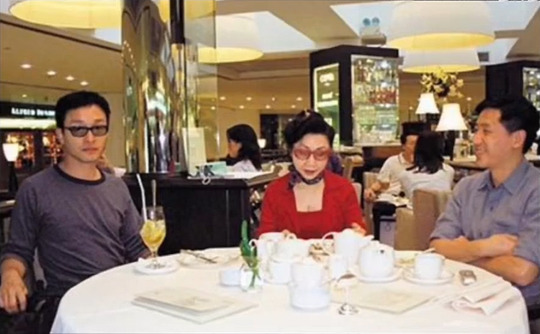
#wlw recommendations#sapphic#lgbtq#asian lgbtq#hong kong#theatre#cantonese opera#chinese opera#yam kim fai#leslie cheung#pak suet sin#yampak#yambak#pak sheut sin#bak sheut sin#hong kong queer icons#not me hastily adding tags because i keep forgetting certain ones
191 notes
·
View notes
Text
ARTICLE: The Florida Man of Formula 1 (2023)

Source: Michael M. Grynbaum, The New York Times
Series: F1, 2023
Logan Sargeant, the only American driver in Formula 1, is zipping around the narrow streets of Baku, Azerbaijan, at roughly 200 miles an hour. His head bounces inside the cockpit as a wheel shudders over a rumble strip. It’s hard to hear over the banshee shriek of his V6 engine, carrying three times the horsepower of a run-of-the-mill Porsche Carrera.
Then the noise stops, and Baku vanishes. We’re inside a low-slung brick building nestled in the Oxfordshire countryside. The track, projected onto a CinemaScope-sized wraparound screen, was a mirage, part of a sophisticated training simulator. (F1 rules prohibit driving the real cars between races.) Mr. Sargeant climbs out of a replica driver’s seat wearing athletic pants. He won’t need a fireproof suit until later.
In three weeks’ time, Mr. Sargeant will do this for real: wind whipping his visor, G-forces of up to six times his body weight pressing on his neck, the ever-present threat of a catastrophic crash as he is watched by roughly 70 million people around the world. For now, it’s time for lunch. “Is chili bad for you?” he asks, digging into a bowl at his team’s commissary. “I don’t think it’s that bad.”

Williams Racing, in Grove, England. It was founded in Oxfordshire in the 1970s, but it’s now an American subsidiary: a Manhattan private equity firm, Dorilton Capital, bought the company in 2020 for an estimated $200 million.

F1 teams employ hundreds of employees and spend hundreds of millions of dollars developing the world’s most sophisticated racecars.
Reaching Formula 1, the highest level of international motor sport, is a big step for Mr. Sargeant, 22, a South Florida native who began racing rudimentary cars known as karts at 6 years old and this year joined the Williams Racing team as the first full-time American F1 driver since 2007.
For Formula 1 itself, finding a hometown hero for American fans is a giant leap.
Although it is enormously popular in Europe, F1 struggled for decades to break into the United States. That began to change in 2016, when the sport was purchased for $4.4 billion by the Colorado-based Liberty Media, owned by the cable magnate John Malone. Liberty ramped up its social media — F1 had barely kept a YouTube page — and backed a popular Netflix documentary series, “Drive to Survive.” Once geared toward aging white men, F1 now has a younger and more diverse fan base. American TV viewership is up 220 percent from 2018, and the sport made $2.6 billion in revenue last year.
Still, a subset of F1 devotees complain about what they see as an overemphasis on entertainment and ginned-up drama. Under Liberty, they argue, pure racing is taking a back seat to cheap tricks to reel in casual viewers. And they often use a dirty word for it: Americanization. “It is becoming more and more like Formula Hollywood,” Bernie Ecclestone, the 92-year-old Briton who built F1 into a global business, griped last year. “F1 is being made more and more for the American market.”
The backlash reached a crescendo at last week’s Miami Grand Prix, which was added in 2022 as a showpiece for American fans. In a prizefight-style pre-race ceremony, the rapper LL Cool J introduced the 20 drivers one by one amid swirling smoke and a squad of cheerleaders. Nearby, Will.i.am conducted a live orchestra playing the rap song he recently recorded with Lil Wayne as part of a “global music collaboration” with Formula 1. (The lyrics rhyme “Max Verstappen,” the name of the sport’s top driver, with “your champion.”)
“Pandering to the American audience is killing @F1,” wrote one fan on Twitter, echoing criticism that bubbled up across numerous F1 websites. Even the racers complained: “None of the drivers like it,” groused Lando Norris, a Briton who drives for McLaren. Undeterred, Liberty announced that the bombastic pre-race sequence would be featured at several more grands prix this year.

In the United States, F1 has long been associated with a certain European mystique, most famously, the louche glamour of the Monaco Grand Prix.
In the United States, F1 has long been associated with a certain European mystique. Its drivers race across the Ardennes forest (Circuit de Spa-Francorchamps in Belgium), the plains of Lombardy (Italy’s Autodromo Nazionale di Monza) and, most famously, the louche glamour of the Monaco Grand Prix. The sport’s stateside image could be summed up by the 2006 comedy, “Talladega Nights: The Ballad of Ricky Bobby,” which featured Sacha Baron Cohen as a pretentious French F1 driver named Jean Girard, a snooty Eurotrash foil to Will Ferrell’s macho NASCAR cowboy.
In 2023, F1 can feel a bit more Ricky Bobby than Jean Girard. In Miami, drivers circled a track built in the parking lot of the Dolphins football stadium, past an artificial Monaco-style “harbor”: blue-painted asphalt topped with ersatz yachts. A new Las Vegas race in November will have cars zooming down the Strip past Caesars Palace. Meanwhile, traditional races in France and Germany are gone.

Katy Fairman, a journalist based in Brighton, England, who runs the F1 podcast “Small Torque,” said she was surprised by the spectacle when she attended a race in Austin, Texas. “There were girls with pompoms,” she said. “I remember watching it and thinking, Oh my gosh, this is so different from anything I’d seen F1 do in a long time.”
Ms. Fairman conceded that some Europeans find the American hullabaloo “tacky.” But she added: “When it’s something to do with America, I think Europeans are quite judgmental. I think it’s just a bit of lighthearted fun. You guys like to have a party.”
The arrival of Mr. Sargeant, who grew up about an hour’s drive from the Miami racetrack, has spurred new interest, including a profile and photo shoot in GQ, and he’s happy to play the part. “What’s up America, let’s bring that energy!” he shouted to the cameras after LL Cool J introduced him as “the local boy done good.”
But as with F1, there are growing pains. In Miami, Mr. Sargeant finished last, his race ruined on the first lap when he damaged a front wing. After the checkered flag, he apologized to his team, his voice barely a whisper: “I’m so sorry. I can’t believe it.”
Weeks earlier, in an interview in England, Mr. Sargeant had demurred about the pressure of wearing the stars and stripes. “I try not to get too caught up in the talk of the role of ‘first American,’” he said. “It’s still very early for me, and I have a lot to learn still.”
If Mr. Sargeant doesn’t perform, there are dozens of drivers eager to take his spot. “At the moment,” he said, “I just have to worry about staying here.”

For a globe-trotting athlete, Mr. Sargeant can be soft-spoken and endearingly self-conscious.
‘I just want to get back in the gym.’
Before his tough Miami weekend, Mr. Sargeant was asked how he would celebrate a top 10 finish. “Honestly, it might sound lame, but probably just go back to my house and get in my bed for another night before I go back to London,” he replied. “That’s all I want to do.”
For a wealthy, handsome, globe-trotting athlete, Mr. Sargeant can be soft-spoken and endearingly self-conscious. It’s not unusual for someone who, like a tennis prodigy or Olympian gymnast, has devoted their life since childhood to a sole pursuit.
Mr. Sargeant was 6 when he and his brother Dalton got a kart from their parents for Christmas. “No one in the family was really even that much into racing,” Logan said. “We just picked it up as a hobby, something to do on the weekend.” He began winning junior races around the country — too easily. To reach the next level and pursue Formula 1, he’d have to leave behind his friends and beloved fishing excursions for life on a different continent: “We just needed a higher level of competition, and at the end of the day, that was in Europe.”
Mr. Sargeant left Florida before his 13th birthday, bouncing between Italy, Switzerland and Britain as he raced on the European junior circuit; in 2015, he became the first American to win the Karting World Championship since 1978. “As a kid, it was tough,” he recalled. “Coming from Florida, being outdoors all the time on the water, great weather — it was literally vice versa.” He eventually settled in London, where he spends most days working out with a trainer. “I get away from a race weekend, and I just want to get back in the gym,” he said. “I hate that feeling of leaving slack on the table.”
It is incredibly difficult to nab a seat in Formula 1. Today’s drivers are physical dynamos trained to optimize their reflexes and performance levels down to how well they can withstand jet lag — critical in a sport that this year will include 23 grands prix spread over five continents. F1 teams employ hundreds of employees and spend hundreds of millions of dollars developing the world’s most sophisticated racecars. But it’s ultimately up to the driver to execute.
It also helps to have money. Lewis Hamilton, the seven-time world champion and F1’s only Black driver, is an exception, having grown up on a London council estate. Many F1 competitors are the sons of multimillionaires (and some billionaires) who can bankroll pricey travel and high-tech cars.
Mr. Sargeant falls into the scion category. He hails from a wealthy Florida asphalt shipping family. His uncle, Harry Sargeant III, is a former fighter pilot and onetime finance chair of Florida’s Republican Party who has been sued by the brother-in-law of King Abdullah II of Jordan and whose name turned up, tangentially, in the 2020 impeachment of former President Donald J. Trump. (Harry was not accused of any wrongdoing.)
Logan’s father, Daniel Sargeant, worked alongside Harry until the brothers had a falling out. In a 2013 lawsuit, Harry accused Daniel of misdirecting $6.5 million in corporate funds “for the purpose of advancing the international cart racing activities” of his sons, Logan and Dalton; that litigation was eventually settled.
In 2019, Daniel Sargeant pleaded guilty in federal court in New York to foreign bribery and money laundering charges related to his business dealings abroad. He is free on a $5 million bond and is awaiting sentencing. A Williams spokesman said that Logan Sargeant was not “in a position to comment” on any of the legal matters involving his family.
In F1, none of this particularly stands out. The mother of Mr. Sargeant’s Williams teammate, Alexander Albon, was jailed in Britain for swindling millions of pounds in fraudulent sales of high-end cars. A Russian racer, Nikita Mazepin, was booted from the sport after his oligarch father, a close ally of President Vladimir V. Putin, was sanctioned following the 2022 invasion of Ukraine.
James Vowles, the Williams team principal, said in an interview that he hired Mr. Sargeant for his speed, not his U.S. passport. “I’m incredibly pleased that the sport is growing in America, but I think it would be anything but disingenuous to say that Logan’s here for any other reason than I think he’s got this pure talent,” he said.
In his F1 debut in Bahrain in March, Mr. Sargeant finished 12th, outpacing this year’s two other rookies. “He has this insatiable desire to be better, to want more,” Mr. Vowles said. “He’s a perfectionist, and I like that in him.”
Tooting around in a Vauxhall Astra
Britain, where Formula 1 originated in 1950, remains the sport’s spiritual home, where most of its 10 teams are based. Williams was founded in Oxfordshire in the 1970s, but it’s now an American subsidiary: a Manhattan private equity firm, Dorilton Capital, bought the company in 2020 for an estimated $200 million.
It was an important cash infusion for a team that had struggled to keep up with rivals. Manufacturers like Mercedes-Benz pour enormous resources into their F1 teams, which double as an elaborate global marketing campaign and an in-house innovation farm; tech developed for F1, like engines that recycle braking energy as an accelerant, can trickle into consumer vehicles.

Formula 1 car simulators at the Williams Racing factory.

Formula 1 drivers practice on sophisticated training simulators.
The Williams campus is a humdrum brick pile that could be mistaken for an office park — a far cry from McLaren’s space-age complex an hour’s drive away. Many F1 teams provide their drivers with a high-end sports car for personal use; Mr. Sargeant commutes in a Vauxhall Astra, a compact.
Even the team’s sponsors are relatively down-market; whereas the official watch of Ferrari is Richard Mille (starting price: $60,000), Williams has a deal with Bremont, whose timepieces retail for significantly less. (On a recent visit, a Williams press aide was quick to extract a spare Bremont watch from his pocket and ensure Mr. Sargeant was wearing it whenever a photographer hovered.)
Given the huge costs, corporate partnerships are crucial to F1, part of the reason the American market, with its abundance of affluent consumers and wealthy brands, has proved so tempting. Gerald Donaldson, a journalist who has covered F1 for 45 years, recalled how cars were gradually taken over by corporate logos starting in the late 1960s.
“Marlboro paid all the Ferrari bills, including the drivers, for many years,” he said in an interview. “There are eager companies who want the publicity.” Mr. Sargeant’s car features ads for Michelob Ultra beer and an American financial firm, Stephens. In Miami last weekend, beachgoers spotted an airborne banner reading “Go Logan!” alongside the image of a Duracell battery.
Last year, the Miami race was viewed on ABC by 2.6 million people, the biggest American audience for a live F1 telecast. Ratings for this year’s race fell about 25 percent, perhaps a result of a duller-than-usual season dominated by one team, Red Bull.
Still, viewing data show that F1 is expanding beyond affluent cities associated with elite sports: In 2022, its top five American TV markets included Asheville, N.C., and Tulsa, Okla. ESPN is clearly betting on more growth. When the sports network renewed its broadcast rights last year, it agreed to pay $90 million annually — up from the $5 million-a-year deal it signed in 2019.
Liam Parker, a former adviser to Boris Johnson who now leads communications at F1, said the sport was intent on rectifying past mistakes. “We were too arrogant,” he said. “We couldn’t understand why the American fan base wasn’t falling in love with us.” But he also pushed back on the complaints that Liberty’s efforts to raise the entertainment factor had stripped F1 of something essential.
“This whole argument of ‘Americanization,’ it’s a very crude way to describe things,” he said. “We shouldn’t ignore things that can improve things for new and core fans. It’s about giving people more choices in the modern era. It’s modernization of access to everyone.”
Mr. Hamilton, arguably the biggest celebrity of the current F1 lineup, has offered his own endorsement of Liberty’s approach. “I mean jeez, I grew up listening to LL Cool J,” he told reporters in Miami. “I thought it was cool, wasn’t an issue to me.”
For all the debates over elitism, good taste and corporate rap collaborations, the core appeal of F1, when you get right down to it, may be something simpler — something Mr. Sargeant got at when asked in the interview if he had loved cars as a kid.
“I absolutely love driving, as you can imagine,” he said. “But to be honest, I’m not one of those people who studies cars and, you know, likes to know every detail of every single car. It doesn’t really interest me.”
“The part that interests me,” he concluded, “is driving them as fast as I can go.”
Eliza Shapiro contributed reporting from Miami. Kitty Bennett contributed research.
Michael M. Grynbaum is a media correspondent covering the intersection of business, culture and politics.
A version of this article appears in print on May 14, 2023, Section BU, Page 1 of the New York edition with the headline: The Florida Man Of Formula 1.
#logan sargeant#year:2023#source:newspaper#one of the best logan articles imo#feel free to message me if you want me to gift you a copy of this article from the NYT with my subscription
76 notes
·
View notes
Text
Karaoke Headcanons: Pillars, Kamaboko, Demons, and more
This all started when Kagaya felt the need to go out and do something with his family. (Actually, it all started with doing Tumblr polls about which Pillars would be the best and worst singers.)This was odd, as the Ubuyashiki family is not in the habit of family outings. The children were all cautiously excited to go to an arcade or something, but Kagaya is old-fashioned so he took them all out to karaoke. (Taisho Secret: Karaoke did not exist in the Taisho period. let me have my fun. These are entirely my own silly headcanons.)
The children were shy at first because they aren't good at letting loose, but once their father smilingly encouraged them to have fun, they got really into singing TV theme songs, which quickly devolved into them acting out scenes from Power Rangers.
Amane can only sing very classic, droning enka. Really deep enka.
Kagaya tells them they all did a wonderful job, and then he sings some simple 1970s love ballads and the energy all falls away because the rest of the family is so relaxed hearing his voice.
It was a refreshing outing, so Kagaya decides to cut the next Pillar meeting short to send all the Pillars out for karaoke together.
A few of the Pillars are grumpy about this but will not say no to a request from Kagaya. Himejima would really rather go home and sleep. When Sanemi starts to complain that he's too busy for this, Shinobu guilts him into staying but saying how he can't imagine him being so busy with only training if he's not also making poison and running a hospital. Iguro stays in the corner happy to watch Mitsuri when she's in the spotlight, but since he's in the corner and she's staying at the other side of the room to have easy access to the door to go back for more soft drinks at the free drink far, he's frustrated by seeing her more easily talk to Giyuu, who is sitting by the door because he was the last one in.
Uzui has a set way of doing karaoke. Certain songs he must always sing or it didn't count as a karaoke session. He insists his warm-up songs don't count as turns. There are songs he hates other people singing with him even though they are ones people usually belt out together, but he gets angry when people don't provide the chorus voices like the "DA-DA-DAT-DA" parts of "Zankyosanka." He makes a bunch of weird adjustments to the volume and pitch settings and just leaves it like that so anyone going after him always has to readjust everything. He and his wives go out to karaoke together a lot and they have a wide repertoire of songs they do together and in different pairings and trios, but in any other group, he does not care about anyone else having fun. He's kind of a pain in the ass to have around in a big group. That said, Giyuu really likes watching and listening to Uzui perform.
Shinobu gives the impression of being a very skilled singer, but that's because she doesn't overdo it and she only sings songs that are within her range and suit her voice well, like "From The Edge." She has sometimes done karaoke by herself to try out new songs she likes, but she is quick to determine when they are out of her skill set. She doesn't push and shove for her turns, and she does take some satisfaction in colleagues complimenting her singing voice. Mitsuri and Rengoku are very enthusiastic in their praise, Muichiro comments in full sincerity that it was nice (but also, he doesn't remember what the point of all this was), and Uzui, who can spot all her restrained methods just by listening, begrudgingly admits she has nice pitch.
Mitsuri knows a lot of popular songs. She's a nice person to have in a karaoke group because she makes an effort to include people by picking songs everyone will enjoy or that a lot of people can sing together. She does not have a wide range of pitch, but she's very good at singing a lot of different kinds of songs in her own pitch. "Koi Kogare" is her favorite lately. Because she is in a position to move around the front of the room easily, she is usually quick to zoom in when Uzui is done singing to change the settings back to volumes and pitches that are more normal for anyone else.
Shinobu and Mitsuri have a bit of a bet going on Giyuu. Shinobu suspects he is either a surprisingly good singer, or a really bad one. It's just a matter of picking the right song for him to test him out, as he is not reaching for the controls to put in anything for himself. Shinobu finally pokes him into trying "Gurenge" because "everyone knows Gurenge," so he relents, because he has heard it and sung along here and there. He's always liked that song because it played a lot in a diner where he likes to eat simmered salmon and daikon. Thing is, Gurenge is not an easy song. Everyone is shocked by how terrible he is on the first few lines, and Mitsuri is very disappointed because she had really high hopes for him to be a good singer. Giyuu can't hear quite how bad his pitch was at first, but after a few lines, he finds the right pitch. He's downright not bad after that, though he was flat here and there and had trouble hitting the high notes.
Because Muichiro doesn't know what to sing, Mitsuri has been trying to help him find something he knows, and just when she thinks it might be hopeless, he says "Kizuna no Kiseki" seems familiar. Yes, he's heard that song somewhere. He knows it. Maybe. Mitsuri is thrilled, and because she knows it too, she says she'll back him up on it. Everyone cheers, and Muichiro does know the first few lines! He knows them really well, actually, and his pitch is pretty okay, and still childlike! But... but then he doesn't sing some of his lines, or he'll just sing a few words here and there... at... random... as they come back to him... Shinobu tries to help by pointing out that the lyrics are on the screen, so he doesn't have to have it memorized, but little by little he just zones out and Mitsuri is stuck singing it all herself, increasingly disappointed and embarrassed, because it feels like she's hogging the mic now. No one minds (except Uzui, who feels they should had just ended the song early if Muichiro didn't know it after all).
Himejima is not unwilling to sing, but the problem is that his tastes are not popular enough to be in the sound bank. He hogged the controls for a long time, searching (with Sanemi's help) for anything he likes or at least knows enough to sing. He starts getting more and more frustrated, because there are songs he really does know very well as he does have a deep appreciation for music. Mitsuri suggests they just turn the system volume down as low as they can and let him sing something a cappella. He smiles and then drones on with something akin to Gregorian chant. Uzui is as patient as he can be but then he insists that they're running out of karaoke time by letting Himejima do something that is not karaoke (also, he can tell Himejima has a very long song in mind). Himejima is somewhat miffed. His singing isn't bad, but he knows he'd show them a much better performance if he had his shakuhachi.
Iguro, in the corner, has been hoping no one has noticed him not singing. But he's also kind of indignant that no one has noticed.
Sanemi has brushed off attempts to get him to sing, which makes Shinobu suspect that he is either a very good or a very bad singer. Rather than get him to sing, she instead engages him in conversation to try to fish out of him what songs he likes. She suspects he likes a lot of songs that have gotten popular for being tearjerkers, and she suspects he sings them with full sincerity, if he ever happens to sing along. But maybe he just listens. He also seems to like rap, and he starts to perk up like maybe he'd be willing to perform some, but Shinobu would prefer not to listen to rap so she finds some reason to disengage from the conversation.
Rengoku has been very enthusiastically cheering everyone on, including banging tambourines with no sense of rhythm (Uzui has forbidden him to touch them during his songs). He admits he's not much of a singer and doesn't have much of an ear for pitch, but there are a few songs he knows well enough to try. Everyone of course encourages him to go for it, as it will probably be a good laugh for everyone, including Rengoku, but then he starts looking up "Homura."
It's one that he has heard a lot because his mother liked it, he explains. Sanemi is nodding along, saying it's a good song, and Shinobu suspects it might be one of Sanemi's favorites. Rengoku apologizes, saying he'll probably butcher it, and he can never find the right pitch at first, and Sanemi nods, saying how it's hard to find the pitch until the song gets going. Shinobu is so sure now.
Rengoku takes the mic, and everyone is ready for some terrible noise they can laugh about for ages to come, but then Rengoku sings.
"Sayonara... arigato... koe no kagiri..."
It's so low that he's hard to hear unless everyone is quiet. It's a rich timbre, but quiet like a prayer whispered into the mic.
"Kanashimi yori motto... daiji na koto..."
The next couple lines go on in the same fashion. With his eyes closed, Rengoku is fully focused on the song, with no idea about the wonder with which everyone else is captivated.
As the song picks up, though, Rengoku has found his pitch.
"KONO! MAMA! TSU-DU-KU TO OMO!TTEITA!!!"
"No!! No, damn it, Rengoku, you almost had it!" Uzui shouts with his hands over his ears.
Sanemi is nearly as upset. "Belting it isn't singing it, man!! Tone it down!!"
"YOBIAAA-TEI---What do you mean, Shinazugawa?"
"Yes, show him what you mean," Shinobu insists and sticks the other mic in Sanemi's hands. With people cheering (it started with Iguro, who was taking some pleasure in seeing Sanemi put on the spot, and then others joined in), Sanemi, beet red, has no choice but to take over just in time to find his pitch for the chorus.
And he's really not bad. Everyone cheers more, especially Mitsuri. Rengoku has totally forgotten about singing and stands there next to Sanemi, stating into the mic how good Sanemi is at this.
Little by little, though, Sanemi gets too into it. He starts pushing the emotional side of it, going past the better reaches of his pitch, and then by the "o-whoa-o-o" part he has lost himself to singing by emotion rather than better judgement. Everyone's kind of over it, and Rengoku, who is still holding the mic, finally joins him in butchering the last part.
They don't have much time left when Mitsuri finally notices that Iguro never had a turn. He says that's fine, he prefers just watching, but now that Sanemi had his turn to be put on the spot, he's not letting Iguro get off easy. Mitsuri squeezes her way over to that side of the room to sit close to Iguro and go through the song bank with him. This is both wonderful and awful; he does not want to sing (especially because he won't sing well with bandages on his face, and even if he takes them off... well, still not likely to sing well), but if Mitsuri offers to sing with him----oh, if she sings with him, then maybe it's ok if his voice just fades out and she takes over!
He tells her he can only sing something soft. She thinks that is so-o-o-o-o cute and sweet, so when he tells her to pick something out, she picks the sweetest song she can think of: "Kamado Tanjiro no Uta."
She pushes him to the front and is so flushed and excited to watch him that the thought doesn't even occur to her to stand up and join him. She just stares with a big expectant smile and glimmering eyes.
And then Iguro suffers, through a long, repetitive song about someone he hates.
Everyone else suffers too, because his voice is muffled, low, clearly unpracticed, and unsuited for the high notes. Everyone just kind of sits around politely and awkwardly. During the flute solos, Himejima really, really wishes he had his shakuhachi. Muichiro audibly asks why Iguro doesn't just stop, but that brings out Iguro's stubborn side and he sings all the way to end, just glaring around the room for the instrumental parts. Mitsuri apologizes later for bullying him into singing it because it clearly made him very uncomfortable to sing in front of people, and he insists that there is nothing to apologize for, for she was just making sure he had fun too. She asks if he means that, and he insists, yes, he loves that song. He insists and will deck anybody who suggests otherwise.
With that, the Pillars have run out of time. Uzui used most of it.
----
So then there comes another day when Tanjiro and friends have finished a mission up easily, and since they are all doing fine with no injuries, there is no need to rush back to the Butterfly Mansion. Why rush just to make Nezuko have to stay in the shadows? No, suggests Zenitsu, they should go somewhere that is already save from sunlight in the daytime so she can have fun with everyone. They should go to karaoke!
Actually, Zenitsu has been practicing romantic ballads for her, but the only way he can get her there is to pretend it's a group thing. Zenitsu tries to make it seem like that at first, giving other a chance to sing. He puts on Gurenge, because everyone knows Gurenge, right? He looks to Tanjiro, who happily assures him that he knows Gurenge, and he really likes that song. Good, good, so Tanjiro can take a turn first, and he gives him one mic, and then they might as well keep Inosuke busy right away so he doesn't get impatient, so he gives the other mic to Inosuke.
He turns around to make some volume and pitch adjustments on the sound system, but then he hears the most HORRID NOISE. After the initial shock he looks back around to see Tanjiro "singing" and Inosuke trying to eat the mic.
No! No, no, no, bad, Zenitsu scolds him and takes the mic. He quickly exchanges it for a new one. Since they just got there he tells the staff it was broken in the first place, but he Thunderclap and Flashes his way back to the room before the staff can ask why it's all wet.
When Zenitsu returns he finds Tanjiro still "singing." He gives the new mic to Kanao, and she does nothing with it. Zenitsu awkwardly tells her she can jump in whenever she wants to and he'll just tell Tanjiro to shut up. She's probably got a good singing voice, after all.
Kanao pulls out her coin. She flips it. She looks at the result, puts the coin, and then continues holding the mic and otherwise doing nothing.
Zenitsu isn't sure how else he's supposed to engage with Kanao, so he leaves her be and snags the mic out of Tanjiro's hands to insist he gives someone else a turn (and give everyone's ears a break). Zenitsu, being a good host (or at least look like one), he offers the mic to Genya and smiles and says it's his turn.
Genya, arms folded, scowls at him and says he's not singing and this is stupid.
Zenitsu isn't sure how else he's supposed to engage with Genya either, so backs away. Gurenge winds down to a close with no one singing it anymore. But oh, would you look at that! It's a super romantic song coming up next, and it happens to be Zenitsu's turn! He picked this song out especially for Nezuko--a duet will have to wait for someday when she doesn't need to wear the bamboo, of course, but in the meantime, he shall serenade her--
Tanjiro apologizes, because Nezuko is fast asleep. But Tanjiro is happy to sing with Zenitsu.
Inosuke, meanwhile, has discovered the free drink bar. The gang is promptly kicked out and banned from that karaoke chain.
--
The Lower Moons aren't invited to the karaoke party, but Mukago works at a karaoke place (not all demons can find work as oiran, after all). Kyogai tries to come sometimes but she always lies to him that all the rooms are full. Enmu works there too, and he spends all his time with his ear pressed to the door and wishing he could be invited in to sing too.
Muzan is in the biggest, snazziest party room with the Upper Moons. He sings a few very classy oldies here and there, but of course only ones that make him sound really good. Douma insists that he should sing Michael Jackson, but Muzan only glares at him for trying to tell him what to do. (Plus, he's touchy about anyone accusing him of stealing the look.)
Kokushibo sings whatever old folk songs are in the song bank, but he is overly serious about songs which now feel dated or just for children. His performance is really dry and monotone, but no one can complain. Muzan can, but he chooses not to because Kokushibo is a good subordinate.
Since Muzan isn't going to, Douma sings Michael Jackson songs on every turn he gets. Hantengu is really nervous about how Muzan looks more and more annoyed about it, but Gyokko is swept up enough that he duets with Douma on some of them. Douma recreates a Vine by banging on Gyokko's vase while singing the "Annie are you ok" line.
They have ordered tons of food for their party. Since they have a Lower Moon working there, the food is of course all freshly chopped up humans. Akaza sneers at it and doesn't want to be there. Douma is bugging him to sing, and he barks at him to back off, but when Kokushibo gets on his case about not disappointing their master, Akaza relents. He puts on Linkin Park. If he was alone, he'd sing "Homura" instead.
Hantengu has a nervous breakdown when it's his turn to entertain Muzan, so he falls apart into four pieces. They all start arguing about what to sing, but Sekido sees Muzan is getting impatient and he gets them all in line to start singing Backstreet Boys. Karaku complains that N*Sync is better.
Gyokko doesn't get a turn to pick a song. No one gives him one. He's stuck just singing backup for Douma, or being used as percussion.
Daki is a very frequent karaoke goer. She's got a very wide repertoire. As soon as she's in the room, she logs into the system with an avatar decked out in fancy accessories, and she competes in all the national singing contests. She gets very frustrated by the singers out there who consistently outscore her, and sometimes, Gyutaro has tracked those people down and killed them. Gyutaro likes the lyrics of "Asa ga Kuru" and wishes he could sing that for Daki someday, but clearly that will never happen so he keeps that wish to himself. He does not sing, and no one ever pushes him to sing because they don't want to hear it anyway. He's happiest seeing Daki rock it instead.
Nakime is there too because she's cooler than Enmu, who is still waiting outside the door and lip-syncing to everything. Nakime, however, is not singing. She's just there to judge everyone.
At some point, Douma did something right by putting on Bohemian Rhapsody. Everybody's into it; partway through they even make Zouhakuten take on the role of the poor boy, though he sings it in a pretty hateful tone.
Muzan eventually gets sick of it before the song is done, and he trashes the place, and he leaves. Mukago is stuck cleaning everything up by herself because Enmu is no help. The end.
---
Meanwhile, Murata does a lot of hitori-karaoke (karaoke by himself). The Kakushi sometimes have pretty normal karaoke outings. Yushiro would be more than willing to go if Tamayo ever showed any drop of interest, but she does not. There are one or two Wisteria houses with karaoke rooms.
Taisho Secret: Karaoke did not exist in the Taisho period.
74 notes
·
View notes
Text
Turkkila & Versluis: “We Want To Differentiate Ourselves From Previous Years”

Earlier this month, ice dance couple Juulia Turkkila and Matthias Versluis skated in the show L'Apprenti Sorcier (The Sorcerer's Apprentice) organized in Champéry, Switzerland. The choreography was done by Salome Brunner and Stéphane Lambiel. The Finns were the only ice dancers in the show. How did they end up there?
“Last year, I edited the music for Deniss Vasiljevs' free program The Lion King,” Matthias says. This season, Matthias has done ten different music cuts for Lambiel's students.
“Towards the end of May, Stéphane asked us if we would be interested in joining the show. It was a great honor,” he continues.
“We were with an amazing group of skaters, some of the world's best. It's unique to skate with a live pianist,” Juulia shares.
In the show, Juulia and Matthias performed to Franz Liszt's Hungarian Rhapsody No 2. They presented wonderful lifts and spectacular movements. The international audience was impressed by the couple's soulful performance.

Finland's top couple has been training hard throughout the summer.
“Early May, we went to Rome for new choreography. In June, we had some vacation time and in July, we went to the Czech Republic for five weeks of summer camp,” Juulia says.
The rhythm dance theme for the 2024–25 season is Social Dancing from the 1950s–1970s.
“We chose music from the 1960s because we suspect that many teams will use disco from the 70s,” Juulia explains.
The pair found a go-go jive song that they immediately liked, and combined it with James Brown's classic I Got You.
“We wanted high energy music that the audience can recognize. There is no slow part in our rhythm dance. It is challenging,” Juulia reflects.

The couple's free dance is the Argentine Tango La Rubia Mirella, which is based on true events. The story was introduced to the couple by an Argentinian tango dancer, who worked with them on and off the ice.
“The beginning is quite soft, but the end is really strong. We want to show that we can be strong and fast. The language of movement is traditional tango, but the program is not built from typical dance movements,” Matthias shares.
Juulia plays a strong woman initially, but is used and abused by men. Matthias plays the role of a villain. The ending is dramatic.
“When there is a clear story, you have to bring in more emotion and drama,” Juulia states.

The pair's programs will first be seen in the Challenger Series competitions, followed by the Grand Prix events in Finland and China.
“We are aiming for medal positions in both GP competitions, and thus a place in the GP final. We are trying to collect world ranking points so that we can start competitions in the right groups during the Olympic season,” the couple says in unison.
With a fierce tango, Juulia and Matthias will be taking a different path this upcoming season, changing their image as classical lyrical skaters.
“We want to differentiate ourselves from previous years. A new combination lift is in the works for the free program, and the choreographic elements will be totally in character with the tango,” Juulia sums up.

#SEATED FOR THIS TANGO ❤️🌹❤️#LET’S GOOOOO ✨✨✨#Turkkila Versluis#Juulia Turkkila#Matthias Versluis#Figure Skating#Ice Skating#Ice Dance#Skating#Dance#Tango#Sport#Art#Finland#Switzerland#Team Champery#Show#Stephane Lambiel#Satoko Miyahara#Shoma Uno#Marin Honda#Koshiro Shimada#Deniss Vasiljevs#Interview
31 notes
·
View notes
Text
diagnosing the last hours characters with modern music tastes
Cordelia: I feel like she'd have two modes. The first would be soft, upbeat, folk and country but also piano-based stuff, anything major key and with big sound. Caroline Jones, Ruth B., Noah Kahan. I also thing she'd really like Shakira. That's her kind of day-to-day music, it's what she puts on in the car, around the house, when going for a jog, etc. But she also has a collection of women rap artists of the Megan and OSHUN variety which is what she puts on when she's doing hard workouts/training.
James: I agree that he'd be emo but I don't think he'd actually listen to a lot of "traditional canon" emo music. I think he'd find it too loud and intense in the wrong way. I think he'd prefer shoegaze, a la Radiohead, and bands like Five Three Eyes that are fast but fuzzed out. Generally anything with softer mastering where it sounds great at a lower volume.
Matthew: He'd love disco and neuvo-disco/retro-rock. Gloria Gaynor, Suzanne Somers, MonaLisa Twins, the Lemon Twigs. It's fun and silly and also empowering, besides which I think he'd like the fashion and the sparkle of it all. On his bad days, though, when the depression and/or ptsd and/or temptation to return to the addiction hits hard, what used to be his heavy drinking days, I think he'd fall back on an artist like P!NK or Florence + the Machine. Someone who can speak to the truth of the lowest lows of where he's been and remind him that he doesn't have to go back there, that there are other choices, things to live for. That, with time and effort, it does get better.
Thomas: He dug up the local college student indie rock station and he listens to it religiously. It's a habit he picked up in Madrid, he wanted to listen to Spanish music but didn't know where to look/how to search for it so he acquainted himself with radio and just flipped stations until he found something with a sound he liked. When asked to pick songs individually/curate his own music I think he'd end up falling back on his dad's taste in music: Eric Clapton, Bruce Cockburn, the Stones.
Alastair: I feel like Alastair would have unarguably the vastest taste in music of the lot of them, but also that it would generally run to music from well before his time. His mom has vinyls and cassette tapes from Iran before the Revolution and he's dubbed CDs and MP4's of them so he has his own copies and isn't stealing her. He enjoys listener-supported classical music radio, and also newer instrumental of the Haygood Hardy variety. He likes soft jazz and blues, Mahalia Jackson, Mama Thornton. He would ADORE Nina Simone. I think if I had to give a taste in music from after 1970, I'd say he also probably likes artists like Tracy Chapman and Mint Green that speak to a similar lived experience to his own.
Christopher: On one hand, I don't think he really cares that much about music. On the other hand, I think he would be the type to unapologetically listen to high school concert band music. He got hold of Robert W. Smith's storms series (Into the Storm, The Tempest, The Maelstrom), realized there's a crap ton of pieces in this genre that are Inspired By Science, and now every time Matthew comes down to the basement laboratory he ends up lodging a complaint about the sheer amount of French horn.
Grace: Living with Tatiana I don't think she was really allowed much if any access to music but I imagine she found ways around that anyhow. I think she's the other person who would really enjoy Florence + the Machine. I think most of her music would be older, melancholy women folk singers. Joan Baez, Judy Collins, Joni Mitchell, Claudia Schmidt, the McGarrigle Sisters. I think she'd find them soothing. They'd help her calm down when things get difficult, help her to find beauty in a world that's caused her mostly pain. I think her favorite artist would be Lenka. She's got this kind of upbeat, slightly silly vibe that would make Grace smile but I also think she'd find that songs like "Silhouette" and "Ivory Tower" could speak to her truth when she needs someone to, without getting too deep in and triggering her.
Lucie: She listens to Kpop and movie soundtracks. Also if it's appeared in one of those "badass women" edits over on youtube 100% she has it on her playlist or did at some point.
Jesse: Like Grace, he didn't really have access to music living with Tatiana. Also he was dead for like almost a decade so there's that. He probably mostly listens to whatever Lucie listens to, but I like to think he does experiments like picking a new genre/radio station to listen to every day, trying to figure out what he likes and doesn't like independently of his girlfriend.
Anna: idk. She strikes me as someone who'd like Siouxsie and the Banshees. Also Halsey and Hozier. Maybe bands like Linkin Park and Evanescence—she doesn't say it because she doesn't like being dissed for listening to "old cringe emo" but they got her through gender dysphoria when she was twelve so she knows there's some worth in them.
Charles: He really doesn't listen to music. He listens to NPR or Radio Canada or the British equivalent because it makes him feel up-to-date and liberal but he doesn't actually hear the content, it just goes in one ear and out the other.
@alastairstom @chaosandtwo
#the last hours#cordelia carstairs#james herondale#matthew fairchild#thomas lightwood#alastair carstairs#christopher lightwood#grace blackthorn#lucie herondale#jesse blackthorn#anna lightwood#charles fairchild#i didn't include ari because i don't feel like i know her well enough to say
37 notes
·
View notes
Text
I don't know if anyone's brought these songs up in the 'Humans Are Space Orcs' community yet but:
The Mary Ellen Carter by Stan Rogers
and Eight Bells by The Jolly Rogers
are two of the most "humans will pack bond with anything" songs ever in opposite in one way but the same in another way directions.
In "The Mary Ellen Carter:"
A bunch of humans are on a ship. The ship crashed and sank because somebody fucked up (specifically, both of the top two officers in charge were consuming mind altering substances while commanding the ship, in a storm, in an area with rocks. Space Orc move.
The company that owns the ship declared it a total loss, or rather their insurance company did, because it was a relatively old ship. The five guys who were last off the ship and got off at the last moment they possibly could were pissed at this and were like "fuck you, that's our ship now." They decide to salvage the ship anyway, and the narrator sees "She's worth a quarter million afloat and at the dock." I don't know how much a ship (I'm guessing a small-ish freighter or fishing trawler but big enough to have significantly more than five crew) cost in the late 1970s but $250k (Canadian, presumably) sounds not that high, so it really sounds like this is a rationalization to claim what they're doing actually makes economic sense, but if you listen to the song you know it's an act of love. The competency of this salvage operation is dubious. It's five sailors or fishermen on a borrowed barge, which they may well be renting dirt cheap or not paying for at all because one of their buddies owned a barge and agreed that this was a good idea. They have spent months diving to the wreck. Presumably with the bare minimum of training since I don't think diving is a skill sailors tend to have, and the narrator has gotten the bends twice in 60 feet of water so presumably they don't really know what they're doing. But goddamnit, they're going to do it, out of love and out of spite for those corporate bastards who treated the ship they pack bonded with like a disposable object!
...And then in "Eight Bells," there's a ship that's had a long service life, and is now old and worn out and the owners decided to dismantle it for scrap wood. And a bunch of sailors who'd spent half their adult lives on this ship were like "Fuck you, we will not stand for this." And proceeded to steal their (retired) ship from the goddamn harbour, sail her out a ways, and set her on fire and run. Aside from the inherent danger of doing this, it's illegal as hell and considering this one's set in the Age of Sail I'm guessing they could be executed or exiled to Australia or something if they got caught doing this. They're risking their lives on a plan that has absolutely no material benefit to anyone. Why? Because they want their ship to have an honorable death.
Peak Space Orc Behavior, folks.
Yes humans' tendency to pack bond with their ships can be a valuable asset, but do not underestimate their capacity to do irrational, insane things because of that bond.
89 notes
·
View notes
Text
youtube
Excerpt from this story from Audubon:
The night of June 10 was warm, but not too much so. After days of rain, Concord, Massachusetts, wrung itself dry. The moon edged toward fullness. Rarely in need of an excuse to wander, Henry David Thoreau took it anyway. He followed Concord’s train tracks out of town and into a moonlit meadow. There, he encountered an iconic bird of the United States: the Eastern Whip-poor-will.
With their cryptic plumage and nocturnal habits, Eastern Whip-poor-wills are rarely seen, but the male’s loud, rhythmic songis hard to miss. Thoreau heard them that evening—five or six at once. A few nights later, when the moon was full, he encountered a dozen or more. “Perhaps this is the Whip-poor-will’s Moon,” he wrote in his journal in 1851.
Into the early 20th century, whip-poor-wills were sheer magic to those who inhabited their breeding range and awaited the species’ return each April and May. An important seasonal sign, the first whip-poor-will’s call signaled an end to frosts and marked the moment to plant sensitive crops, like corns and beans. Farmers let cattle out to pasture. Children knew they could play outside barefoot.
Quirkier and more personal rituals developed around their appearance. One could make a wish on his song, roll on the ground three times for a year without backpain, or shake a pocket full of coins for a year of financial success. Some people believed the repetitions of his name, which he can sing for many hours, predicted how many years they would live or, if they were unmarried, how many until they’d wed. In an article that circulated widely in 1941 and 1942, the United Press reported that an Alabama man—known to friends and family as “Uncle Rip”—waited to have one of his two annual haircuts until whip-poor-wills returned.
The whip-poor-wills’ tune was also part of the nation’s emotional landscape. To 19th century poets, whip-poor-wills might sound mournful, plaintive, and grieving. To John James Audubon, the “cheering voice” of the whip-poor-will was his “only companion” on nights alone in the woods. Others heard the sound of loneliness. When Hank Williams wanted to convey that emotion, he sang of a whip-poor-will who “sounds too blue to fly” in his often-covered 1949 classic, “I’m So Lonesome I Could Cry.”
Yet in the decades since Williams belted those classic opening lines, much has changed for the whip-poor-will—and for our own relationship with the species.
While many kinds of birds are experiencing population declines, whip-poor-wills are especially vulnerable to habitat loss, pesticide use, loss of prey, car strikes, and predation. Ornithologists estimate that the Eastern Whip-poor-will population decreased by nearly 70 percent between 1970 and 2014. But their decline may have begun sooner. After World War II, agricultural and suburban development swallowed great swaths of woodlands. As early as the 1950s, writers like Knoxville News-Sentinel’s Lucy Templeton, whose “A Country Calendar” often included reports and lore about whip-poor-wills, worried over their disappearance from local landscapes.
We’ve changed, too. Many people moved away from the rural towns where they grew up amid birdsong. In the suburbs that replaced bird habitats, we homogenized landscapes with decorative plants unwelcoming to whip-poor-wills. If whip-poor-wills seemed to abandon our world, we also abandoned theirs.
To describe the human consequences of species decline, the lepidopterist Robert Michael Pyle coined the term “extinction of experience,” an ecological insight gained through his own moments of loss.
31 notes
·
View notes
Text
Personal Canons (past life based)
In no particular order.
🪙 Greaseball is a minimalist in decor in that his walls are plastered with one type of thing. Trophies, medals, ribbons, his past livery vests, and gifts from his multitude of fans be them human or other trains.
🪙 Ashley and Buffy were M-10000's coaches which were restored for use in my train and later lent to Greaseball depending on the type of passenger train he was meant to pull. They stay together all of the time because they were meant to be a trainset however they were bi, as shown in places such as A Whole Lotta Locomotion (song about GB based on the lyrics and dance moves such as the flexing which no one else does) and Pumping Iron's iconic simping from the coaches.
🪙 an old emd9, m-10000, zephyr, and another... were engines used to gather code for GB's creation. He has some stylings from GTELs and Centennials to show his strength. He is fast when pulling little, such as for races. Slower then pulling heavy trains where speed is converted to effort.
🪙 Greaseball rarely pulled freight. He only did so in unusual circumstances since the company wanted to keep sightings of him quite exclusive to his passenger train work, competition events, and railfan related ones.
🪙Dinah was from old passenger service from the overland route. Upon my request, her car was restored and colors amped up to draw in young new riders and not just old nostalgic people who once rode passenger trains in the pre-1970s
🪙I took in CB from being scrapped or sold to the caboose hotel, it was undecided, into my yard because I missed having a caboose at the end of my freight trains. EoT devices just are not as fun or interesting to me. I prefer having a dedicated car for it.
🪙GB yelled out Caboose! in the race where the japanese national falls over the edge as a warning. Caboose is not rated for those speeds. He is made for freight not a bullet train and would not be able to safely brake. To save at least himself, he disconnects. No foul play. the Japanese national was being unsafe.
#starlight express#stex#I do not consider personal canons to be headcanons#that would be like me calling your recollection of your own life a headcanon#it is a term i am testing instead of saying 'past life' all the time#personal canon#male GB related
13 notes
·
View notes
Note
ur wip titles sound so good!! can't decide which one I'm excited for the most, so pls tell us more abt all of them👀 ! (if u want ofc)
AH oh yes! Gladly!

1. Melancholia — song mingi
summary: when all hell breaks loose among the main mafia families, your father arranges your own marriage to Song Mingi, the son of the most dangerous mafia boss. You’re told he’s cold-blooded, a monster of men, but when you start to get closer to him, you begin to see his true, sweet persona no one ever cared to know about.
genre/au: mafia au, arranged marriage au, enemies to lovers, smut, angst
This one is a request

2. Orange Juice — song mingi
summary: growing up as neighbors, you and Mingi were inseparable. Everything came to a screeching halt when he disappeared one summer after a terrible car accident. Years later, he walks through your door, nearly in tears when he sees you. So much has changed, but not how you feel about each other.
genre: angst, smut

3. Sensual Politics — jeong Yunho
part of swift classics series collab with @yourdreamsyourwish-2
summary: set in the 1970’s, you push your way through the obstacles to enter the country's most prestigious law school. With your head on straight, you meet a shy, handsome boy in your major, and fall into a sweet love that you hoped would last forever and ever.
genre/au: more than friends, less than lovers, college au, 1970’s

4. If We Were Vampires — kang yeosang
summary: while living out the last of your sickly days, you begin to wonder how your life would be if you were a vampire. Living forever with the love of your life sounds delightful, but one nightmare changes your whole perspective. Knowing that this can’t go on forever makes it much more special.
genre/au: angst, melodrama, some fluff, smut
based on the song 'if we were vampires'

5. We fell in love in July — Choi San
summary: as the daughter of the notorious underground fight club owner, you’ve had to deal with a fair share of crazy fighters—and there’s one you hate the most. He’s brutal, has no class, and is a certified dickhead. But after a drunken kiss…it’s impossible to see him in the same light as before…
genre/au: smut, slight angst, enemies to lovers, fight club au, grumpy-sunshine

6. Astrophilia — park seonghwa
part of swift classics series collab with @yourdreamsyourwish-2
summary: with only a month left after being diagnosed with cancer, you meet a mysterious man on your train to nowhere. He offers you an ultimatum—you can be pain free for your remaining days if you teach him how to love, as it guarantees both his salvation and your comfort.
genre/au: supernatural au, terminal illness au, angst, fluff

7. Blissful Ignorance — choi jongho
summary: Jongho is the all-star on the University’s basketball team, but as his grades start to drop, he is about to fall from the heights. As he struggles to raise his grades, you swoop in to save him from the fall as his tutor. Despite him being the man of your dreams, you act like you hate him and everything about him. As he falls for you despite your ignorance, he begins to question who he is and where his priorities lie.
genre/au: enemies to lovers, reverse academic rivals, university au

8. Everywhere, Everything, You. — jung wooyoung
summary: love is a tricky word for you and wooyoung. you grew up together, shared your firsts together, and as the years went on, you both went your separate ways. when you meet again, everything in you craves for his love. everywhere you go, everything reminds you of him. Can you let yourself fall once again, even when the future isn't guaranteed?
genre/au: angst, fluff, smut

9. Savior Complex — kim hongjoong
summary: Your life wasn't worth living anymore. After a night of drinking alone, you find yourself on top of your apartment building, ready to risk it all. Suddenly, you are tackled to the ground by a pizza delivery boy, who looks even more upset than you were. Now, ever since then, he is hell-bent on making sure you're okay—following you around to protect you as if his life depended on it.
genre/au: strangers to lovers, angst, smut

10. Tis the Damn Season — kim hongjoong
summary: as you arrive in your hometown for the holidays, you run into the only boy you ever loved. Knowing that this time of the year was rough for both of you, you promise to spend the weekend together one last time, giving both your families a little hope for the future.
genre/au: old flame au, holiday au, angst, smut, slight fluff
Hope these interest you!!!! I’m currently working on a few of them more than others, so hopefully they’ll be out soon!!
75 notes
·
View notes
Text

David Soul (born David Richard Solberg; August 28, 1943 – January 4, 2024) Actor and singer known for his role as Detective Kenneth "Hutch" Hutchinson in the television series Starsky & Hutch from 1975 to 1979; Joshua Bolt on Here Come the Brides from 1968 to 1970. As a singer, he scored one US hit and five UK hits with songs such as "Don't Give Up on Us" (No. 1 in US, Canada, and UK) in 1976 and "Silver Lady" (No. 1 in UK) in 1977. He also starred in the 1979 hit TV movie adaptation Salem's Lot by Stephen King.
Soul first gained national attention as the "Covered Man" appearing on The Merv Griffin Show in 1966 and 1967, on which he sang while wearing a mask. He explained: "My name is David Soul, and I want to be known for my music." The same year, he made his television debut in Flipper.
In 1967, he signed a contract with Columbia Pictures and following a number of guest appearances, including the episode "The Apple" from the second season of Star Trek, he landed the role of Joshua Bolt on the television program Here Come the Brides with co-stars Robert Brown, Bobby Sherman and Bridget Hanley. The series was telecast on the ABC network from September 25, 1968, to September 18, 1970. In 1972, he co-starred as Arthur Hill's law partner on Owen Marshall: Counselor at Law. Following numerous guest-starring roles on TV, including The Streets of San Francisco.
His breakthrough came when he portrayed Detective Ken "Hutch" Hutchinson on Starsky & Hutch, a role he played from 1975 until 1979. During his career he made guest appearances on Star Trek, I Dream of Jeannie, McMillan & Wife, Cannon, Gunsmoke, All in the Family, and numerous TV movies and mini-series, including Homeward Bound (1980), World War III, and Rage (1980), a TV movie commended on the floor of the U.S. Senate and for which he received an Emmy Award nomination. Soul also starred with James Mason in the 1979 TV miniseries adaptation of Stephen King's Salem's Lot, which was edited and released as a theatrical feature film in some countries.
He continued to make guest appearances in various television series. He starred in the miniseries The Manions of America as Caleb Staunton in 1981. He starred in the short-lived 1983 NBC series Casablanca, playing nightclub owner Rick Blaine (the role that was made famous by Humphrey Bogart in the 1942 film Casablanca), and co-starred in the NBC series The Yellow Rose during the 1983–1984 season. He also starred in the television adaptation of Ken Follett's wartime drama The Key to Rebecca (1985) directed by David Hemmings. He later starred as the infamous Florida robber Michael Platt in the TV movie In the Line of Duty: The F.B.I. Murders (1988), which depicted the 1986 FBI Miami shootout, subsequently used as an FBI training film. Soul also directed the episode "No Exit" of the 1980s TV series Miami Vice. (Wikipedia)
IMDb Listing
#David Soul#TV#Obit#Obituary#O2024#Starsky and Hutch#Here Come the Brides#Casablanca#Salem's Lot#Owen Marshall: Counselor at Law#The Manions of America
23 notes
·
View notes
Note
omg since you’re taking off todya from studying can we hear some of your beatle hottakes?
ughhhhhhh sorry, these are so hard to come up with these days
meta take: I sort of wish we could have a genuine conversation about the blurry line between wishful thinking/headcanon and more objective (or, aspiring to be objective) historical analysis – I get the headcanons, I really do! but just in the past year, there's been several instances of people in good faith asking about sources or questioning "fan favourite" anecdotes and being shouted down for "ruining people's fun". If you want to engage with this stuff in a more lighthearted way, that's fine! but accept that that's what you're doing. Being rude to people trying to get to the truth is not a good look. Your imagination can withstand it, I promise.
more people need to jump on the Day Tripper tinhatting train. shit's crazy up here
the more I listen to Double Fantasy the more I'm offended that a certain brand of John fan basically only names songs from 1970/71 as his best. ditto with Walls and Bridges…
Again And Again And Again: best Denny solo-written Wings song ( it's hard to gauge how much is him and how much is Paul for their collabs. Anyways, No Words my beloved)
Sexy Sadie is kind of perfect… The lyrics, the chords, the distorted doo-wop it all embodies that DISAPPOINTMENT so well. The guitar solo is great, the high-pitched oooooooooohs. No notes, underrated song for sure.
the Mind Games album cover is soooooo deranged but so fucking good. That and Ram might be the best post-Beatles album covers.
this isn't exactly a take but the SADDEST part of Hey Jude is when John harmonizes with Paul. I can't not hear all the unspoken pain.
I kind of hope we get versions of Free As A Bird and Real Love with cleaned up John vocals like Now And Then. I don't want to erase those originals because the audio quality tells a story of its own, but Real Love especially suffers so much from it. I listened to it earlier today and nearly got teary. "No need to be alone" kind of gives me goosebumps. There's something so raw and emotional about all three of these songs…
This is almost the opposite of a hottake, but it kind of Doesn't Matter To Me who Now And Then is about. It could be about Paul, it could pretty easily be about Yoko too, and a few people I've seen say they think it's about May, which could be too! It perhaps not being directed at Paul doesn't take away from the song for me, because the song feels bigger than just its direct inspiration.
On that note, I sort of think that sometimes people could stand to.... Die on fewer hills? Like, the notion that Now And Then could be about Yoko doesn't negate John and Paul's relationship or most things people theorize they may have gotten up to.
Now And Then Release Week bonus round, cause it's been long enough to talk about it a bit:
Paul (and Ringo and George! they also have a writing credit, guys!) making editorial choices about John's unfinished song with the blessing of his widow is literally fine. "But John might not have approved–" yes, this is how death works. John also might have found the song embarrassing and not wanted it released at all. It wasn't on Double Fantasy after all! Or maybe he would have specifically wanted to remove the same bit! (which I maintain is musically strange and unfitting at worst and at best a still really rough idea that would probably require a lot of work in of itself – echoing the chord progression in the instrumental bit is the best compromise I could imagine)
I actually really get the George girls who were a bit bummed out by the rollout of the song. He DID get the short end in this situation! but… what would have been better? I saw some people say Paul isn't nearly as good a slide guitarist at George. Okay well then… So Paul should've hired a session musician? How does that makes sense? Paul should've asked Dhani to find some random guitar bit George recorded 25 years ago and frankensteined it onto this song? I'm asking this honestly: what should have been done instead? Because… I sort of got the feeling from some of the criticism that the only acceptable solution was to not release this song at all. And TBH I don't think George "getting the short end" is worse than not allowing Paul and Ringo the closure of completing this song.
This wasn't perfect but again: yes, this is how death works.
27 notes
·
View notes
Text
Uncertain Ground (5)
WC: 900+ words
Warnings: 1970s, angst, fluff. Hurt/Comfort.
If you like my work, consider buying me a coffee or subscribing to my Patreon. It’s just $2 a month and I promise you won’t regret it.
Masterlist

Abby kicked off her shoes in the dressing room, walking back to the bathroom to wash her makeup off, splashing her face with some cool water to calm down a little, finally realising what had happened.
Aside from the situation between Ben and Crimson, things had gone well, and that was one of the reasons her mind was running and running.
Ben, and Crimson.
And she wasn’t feeling any jealousy, not this time.
Something else was brewing inside her.
The past few months had felt like a dream coming true, and a nightmare all at once.
Ben felt like he was her prince in shining armour, but seeing him like this, seeing what he could turn into - something cruel, a cold man who would snap so quickly not even a hero like Crimson Countess could defend herself fast enough.
What was she doing?
Where had she gotten herself into?
How long until it was at Abby he was snapping at?
Until her neck was the one he was squeezing while people watched and no one stopped him?
She fought not to cry at the thought. Abby couldn’t be in that position again, not after she had made her life better.
She wouldn’t let anyone harm her again.
“Sweetheart?” she heard.
Abby nearly jumped out of her skin, looking up the mirror to find Ben inside her dressing room.
She moved to continue to wash her face, not wanting to give him attention yet. They always powdered her skin so much.
Still, Ben walked to the bathroom and leaned onto the doorframe, watching her.
“It’s a lovely song,” he remarked.
She stepped away from the sink, grabbing a towel to dry her face.
“I’m glad you like it.”
Ben continued to watch her and smiled charmingly.
“You should come with me to the after party,” he suggested. “Carson has the best drinks-”
“No, thank you,” she hung it back up. “I think I’ll just head home, I don’t want to step on any more toes.”
He shrugged on his spot.
“If this is about Countess, she isn’t coming,” he assured her.
She couldn’t care less about Countess right now.
“Ben,” she exhaled. “We need to talk about what happened.”
He stopped, staring at her in shock, and he shook his head.
“Sweetheart, you don’t understand,” he corrected her. “I was protecting you!”
Ben walked to her and grabbed her shoulders, standing in front of her, and took a hand to raise her chin to make her look at his face.
"I didn't want her to hurt you,” he continued. “The things she was saying, and I know she was going to say... you shouldn't hear that!”
Abby had heard a lot from people. She was born a black woman during segregation, a little curse word from a racist white woman wouldn’t be the worst she had to face when trying to make a name for herself.
“This isn’t it and you know,” she interrupted him. “What about the bank, Ben? What’s your reasoning behind your actions there, uh?”
He stared at her, looking confused.
“What?” Ben asked. “Are you still thinking about that? They were criminals!”
She pushed his hands away from her.
“That doesn’t give you the right to be judge, jury and executioner!”
Ben frowned, eyeing her up and down.
“Why are you doing this?” he asked. I thought you loved me?”
The question threw her out of her train of thought.
What?
“Jesus Christ, Ben,” she took her hands to her hair. “Loving you don't mean blindly following whatever you say.”
She swallowed down, stepping back from him and walking down her dressing room.
Abby loved him! She didn’t want to lose him.
“You scare me,” she confessed. “The things you do… I don’t understand them.”
Ben walked to her again, taking her hand and making her face him again.
“You have nothing to fear from me,” he promised her. “It’s everyone else you should be scared of.”
He caressed her cheek gently, and Abby continued to watch him, not knowing what to say.
“No weak man can compare to me,” he smiled a little. “To the way I feel for you and the things I do for you… they can never love you like I do.”
Her eyes widened in surprise.
He loved her?
“We are strong and powerful, and even more together,” he reminded her. “Don’t you know that?”
Abby sighed and took a hand to his, squeezing it.
“Just promise me you won’t hurt anyone else because of me,” she asked him. “Please. I am strong too, I can protect myself.”
Ben stared at her with frowned eyebrows, clearly debating with himself for a long moment, before finally leaning in and kissing her lips.
“Alright,” he hummed, resting his forehead on hers. “You win.”
Abby smiled and relaxed, kissing him a little more, and Ben moved his hands down, squeezing her waist as he pulled away.
“What do you say we skip the party and just head to my place?” he suggested.
She perked up.
His place?
She had never been there.
“What do you say, baby,” he purred. “Do you want to come to my humble abode?”
Abby worried. What if someone followed them, the paparazzi were unbearable with some people!
“Are you sure?” she asked. “What if-”
Ben kissed her again, interrupting her before she could finish her question.
“You’ve worried enough for the night,” he assured her. “I’ll deal with everything else.”
…
“Uncertain Grounds” was fully posted on my Patreon on 2022. If you like Soldier Boy and other Jensen Ackles characters, and like the idea of having early access to my work, consider checking it out. It’s just $2 a month and I promise you won’t regret it. (link takes you to the public masterlist)
…
Forever Tags: @emoryhemsworth @amythyststorm33 @shaelyn102 @yknott81 @letsdisneythings @maximofftrash @kgbrenner @thefridgeismybestie @magpiegirl80 @mogaruke @shadowhunter7 @musicalcoffeebean @megasimpleplan4ever @deemoriarty @05spn18 @malindacath @kdcollinsauthor @random-fandom-fangirl2112 @widowsfics @frozenhuntress67 @averyrogers83 @notyourtypicalrose @nerdypinupcrystal @giruvega
#Welldonebeca's Uncertain Grounds series#soldier boy#soldier boy fanfiction#soldier boy fanfic#soldier boy x you#the boys season 3#soldier boy x reader#soldier boy smut#soldier boy angst
20 notes
·
View notes
Text
Thanks to @burberrycanary and @vivelarevolution13 for tagging me in this catch-up meme. 💜
Last song I listened to: "Dripfield" by Goose. (But on and off today it's been "obsessed" by Olivia Rodrigo and "Too Sweet" by Hozier, both of which are pushing the "tasty riff" buttons in my brain.)
Last thing I read: This oral history of the making of Clueless, which is a Vanity Fair piece excerpted from a longer book!
Last movie I watched: Sholay (1975), which has EVERYTHING. Romance! Tragedy! Buddy comedy! A train robbery! Satire of imperialism! Canadian tuxedos! Groovy color! A young Amitabh Bachchan! A 1970s amount of chest hair! You will watch three hours of this 1970s Indian musical Western (yes really) and think to yourself "Honestly, I could have watched some more of this."
Last TV show: "Ugliest Houses in America" on HGTV, which is worth it just to hang out with Retta for a while.
Last thing I googled: "Apothic Dark review" (my thoughts: it was fine to cook with, but not my favorite drinking wine)
Last thing I ate: A s'more (toasted over a stove burner).
Sweet, salty, or savory: I really prefer any two of these in conjunction tbh...but probably sweet? (The real answer is "bread.")
Sleep: Soon, thank you, yes.
Currently reading: I just finished How I Won A Nobel Prize (which I would honestly very much like to discuss with someone) and am preparing to start North Woods.
Tagging (as always, with no obligation): @imreallyloveleee, @earthlaughsinflowers2, @hieronymus-bush, @stillscape, @stirringsofconsciousness
11 notes
·
View notes